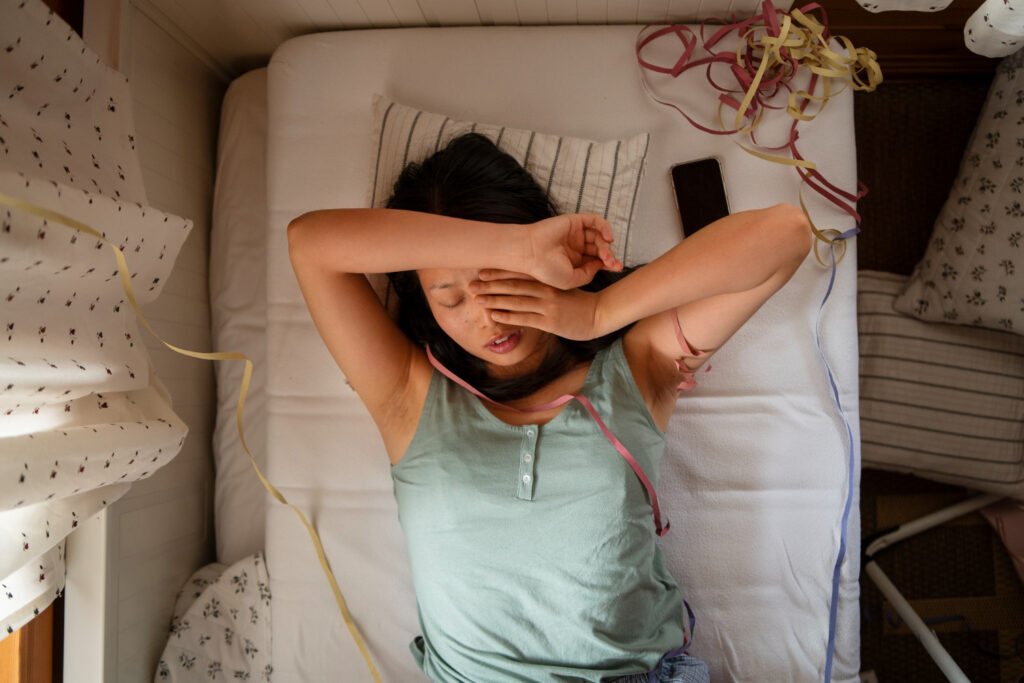Idiopathic hypersomnia is a sleep condition characterized by extreme daytime drowsiness and a strong desire to sleep throughout the day, despite having gotten a full night’s sleep. Unlike narcolepsy, another sleep disease that causes daytime drowsiness, people with idiopathic hypersomnia do not suffer from cataplexy, or the intrusion of rapid eye movement (REM) sleep into waking.
Here are some important facts concerning idiopathic hypersomnia:
Excessive Daytime Sleepiness: Excessive daytime sleepiness (EDS) is the defining symptom of idiopathic hypersomnia. Individuals with this disease frequently struggle to stay awake and aware during the day, which causes problems at work, school, and in everyday activities.
lengthy sleep duration: People with idiopathic hypersomnia sleep for lengthy amounts of time at night (usually more than 9 hours) and may also take long daytime naps that do not give considerable relief from their drowsiness.
Difficulty Awakening: Individuals with idiopathic hypersomnia may have difficulty waking up from sleep. They frequently suffer “sleep inertia,” or the sensation of grogginess and disorientation upon awakening.
Nocturnal Polysomnography: To rule out other sleep disorders such as sleep apnea or narcolepsy, nocturnal polysomnography is commonly performed. It aids in the confirmation of the diagnosis of idiopathic hypersomnia.
No Underlying Medical Etiology: The term “idiopathic” refers to the fact that the etiology of the ailment is unknown. There is no underlying medical ailment, medicine, or substance addiction that can explain the extreme drowsiness in idiopathic hypersomnia.
Impact on Daily Life: Idiopathic hypersomnia can have a substantial influence on an individual’s quality of life. It can cause cognitive impairment, emotional disorders, and trouble sustaining relationships and work.
Treatment: Treatment options for idiopathic hypersomnia are limited and focus on symptom management. Stimulant drugs such as modafinil or methylphenidate are occasionally recommended to aid with daytime wakefulness. Lifestyle changes such as having a consistent sleep pattern and abstaining from alcohol and certain drugs may also be advised.

It’s crucial to remember that idiopathic hypersomnia is a chronic illness, and therapy may need to be adjusted to each person’s specific needs. Individuals suffering excessive daytime drowsiness must seek examination and assistance from a healthcare expert, ideally a sleep specialist, in order to receive an accurate diagnosis and effective management of their symptoms.
How to get rid of idiopathic Hypersomnia
While there is no known cure for idiopathic hypersomnia, there are therapy options available to help control symptoms and enhance quality of life. Idiopathic hypersomnia treatment often focuses on lowering excessive daytime drowsiness and promoting alertness.
Here are some prevention and treatment strategies:
Stimulant Medications: These drugs might help you stay awake during the day. Modafinil (Provigil) and methylphenidate (Ritalin) are two commonly prescribed stimulants. A healthcare expert should decide the drug and dose depending on individual needs.
Non-stimulant drugs: Non-stimulant drugs may help some people with idiopathic hypersomnia. Among these are drugs such as sodium oxybate (Xyrem), which can enhance both nocturnal sleep and daily alertness.
Changes in Lifestyle and Behavior: Certain lifestyle changes can also help control symptoms.
Maintain a consistent sleep schedule: Going to bed and getting up at the same time every day might help your body’s internal clock adjust.
Avoid alcoholic beverages and certain medications: Alcohol and some drugs might make you sleepy; talk to your doctor about any medications you’re taking.
Create a sleep-friendly environment: Maintain a dark, calm, and pleasant environment in your bedroom.
Naps: Short strategic naps (20–30 minutes) might occasionally enhance alertness during the day; however, protracted daytime naps may not give significant relief from tiredness.
Caffeine: A moderate amount of caffeine might offer a momentary energy boost. Caffeine, on the other hand, should not be used excessively, as it might interfere with sleep.
Regular physical exercise: Regular physical exercise can improve sleep quality and overall wakefulness. However, it is critical to avoid strenuous exercise close to bedtime.
Stress Management: Excessive stress might increase tiredness. It might be good to learn and practice relaxation techniques such as meditation or deep breathing exercises.
Cognitive Behavioral Therapy (CBT): CBT for insomnia can be beneficial for some people suffering from idiopathic hypersomnia. Its goal is to increase sleep quality and create good sleeping habits.
Support Groups: Joining a support group or seeking therapy can provide emotional support as well as practical help for coping with the issues of idiopathic hypersomnia.
Regular Follow-up: It is critical to maintain ongoing monitoring and contact with a healthcare expert. Treatment strategies may need to be adjusted over time to accommodate shifting symptoms and demands.


[…] Idiopathic Hypersomnia: Top 10 Best Tips for Management and Relief […]